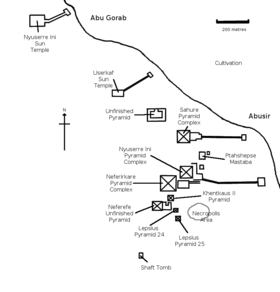Busiris
Busiris or Bousiris (Greek: Βούσιρις) may mean refer to the following:
Places
Greek mythology
Arts
See also

Abusir
Abusir (Arabic: ابو صير Egyptian Arabic pronunciation: [æbuˈsˤiːɾ]; Egyptian pr wsjr; Coptic: ⲃⲟⲩⲥⲓⲣⲓ busiri, "the House or Temple of Osiris"; Ancient Greek: Βούσιρις) is the name given to an Egyptian archaeological locality – specifically, an extensive necropolis of the Old Kingdom period, together with later additions – in the vicinity of the modern capital Cairo. The name is also that of a neighbouring village in the Nile Valley, whence the site takes its name. Abusir is located several kilometres north of Saqqara and, like it, served as one of the main elite cemeteries for the ancient Egyptian capital city of Memphis. Several other villages in northern and southern Egypt are named Abusir or Busiri.
Abusir is one relatively small segment of the extensive "pyramid field" that extends from north of Giza to below Saqqara. The locality of Abusir took its turn as the focus of the prestigious western burial rites operating out of the then-capital of Memphis during the Old Kingdom 5th Dynasty. As an elite cemetery, neighbouring Giza had by then "filled up" with the massive pyramids and other monuments of the 4th Dynasty, leading the 5th Dynasty pharaohs to seek sites elsewhere for their own funerary monuments.

Busiris (Greek mythology)
Busiris (Greek: Βούσιρις) is the Greek name of a place in Egypt, which in Egyptian was named ḏdw (pronounced Djedu). The location was an important necropolis and a centre for the cult of Osiris, hence name Busiris. The word Busiris was also used to refer to chief god of Busiris, an attribute of Osiris.
In Greek mythology, Isocrates, in his witty declamation Busiris recounts "the false tale of Heracles and Busiris" (11.30–11.40), which was a comic subject represented almost entirely in the repertory of early 5th century BC Athenian vase-painters: the theme has a narrow narrative range, according to Niall Livingstone: Heracles being led to sacrifice; his escape; the killing of Busiris; the rout of his entourage.
The brief synopses concerning Busiris in pseudo-Apollodorus' Bibliotheke are at II.1.5 and II.5.11: Busiris there is one of the fifty sons of Aegyptus, betrothed to a Danaid. In Isocrates' rhetorical use of a theme that he considers unworthy of serious treatment, the villainous king of Egypt named Busiris, a son of Poseidon and Anippe, daughter of the river-god Nilus, was the ancient founder of Egyptian civilization, with an imagined "model constitution" that Isocrates sets up as a parodic contrast to the Republic by Plato. The monstrous Busiris sacrificed all visitors to his gods. Heracles defied him, broke his shackles at the last minute and killed Busiris.
Podcasts:

-
by Johnny Hallyday
-
by Scott Walker
-
by Jay Electronica
-
by Pierre Perret
-
by Mandator
-
by Robert Wyatt
24000 Baisers
by: Johnny HallydayAime-moi
Comme je t'aime
Si tu veux bien me laisser faire
Pendant une journée entière
Je suis capable pour te plaire
De te donner 24000 baisers
Je prends des paris à la ronde
Sans perdre plus de dix secondes
Je promets devant tout le monde
De te donner 24000 baisers
Je ne sais pas ce qui ce passe
Vois-tu chérie plus je t'embrasse
Plus j'ai envie de t'embrasser
J'aime assez ça quand tu m'enlace
Et comme je ne suis pas de glace
Je ne laisserais pas ma place
Quand je te donne 24000 baisers
Je fais un trait toutes les demi-heures
J'en suis au moins à huit cent mille
Et je ne peux pas m'arrêter
Je prends des paris à la ronde
Sans perdre plus de dix secondes
Je promets devant tout le monde
De te donner 24000 baisers
Et lorsqu'une fois centenaire
Il me faudra quitter la terre
Sans même faire une prière
Je suis bien certain que Saint-Pierre
En me voyant toujours sincère
Me permettra de t'embrasser
Tout le temps de l'éternité.
Latest News for: busiris
- 1
